Kobe Bryant: Based on NeemTime research
Biography / Personal Details / Who is Kobe Bryant
Kobe Bryant was a legendary American professional basketball player widely regarded as one of the greatest athletes in the history of the sport.
He was born on August 23, 1978, in Philadelphia, Pennsylvania, and was the youngest of three children in a basketball-centric family.
Kobe spent 20 years playing for the Los Angeles Lakers in the NBA, where he became a global icon both on and off the court.
Known for his intense work ethic and competitive spirit, he coined the term “Mamba Mentality” to describe his relentless pursuit of excellence.
Fluent in several languages, including Italian and Spanish, Kobe was known for his intelligence and global perspective beyond basketball.
He stood 6 feet 6 inches tall and played primarily as a shooting guard, wearing the jersey numbers 8 and later 24 during his career.
Kobe entered the NBA straight out of high school, becoming one of the youngest players ever drafted at age 17.
He won five NBA championships with the Lakers and was an 18-time All-Star, known for his clutch performances and scoring ability.
Off the court, he was involved in storytelling, philanthropy, and business, with a passion for creative arts and youth development.
Kobe tragically passed away in a helicopter crash on January 26, 2020, alongside his daughter Gianna and seven others, leaving behind a powerful legacy.
Background / Childhood / Early Life Highlights of Kobe Bryant
Kobe Bryant was born to former NBA player Joe “Jellybean” Bryant and Pamela Cox Bryant, growing up in a household that emphasized sports and discipline.
He spent part of his childhood in Italy, where his father played professional basketball, and developed a love for soccer and the Italian language.
Returning to the U.S. as a teenager, Kobe attended Lower Merion High School in Pennsylvania, where he quickly became a basketball sensation.
At Lower Merion, he scored over 2,800 points and led his team to a state championship, drawing national attention from scouts and colleges.
He was known for his focused mentality and daily training habits even in high school, often practicing with older players to sharpen his skills.
Bryant skipped college and declared for the NBA Draft in 1996, a rare and risky decision at the time for high school athletes.
He was initially drafted 13th overall by the Charlotte Hornets but was traded to the Lakers, where he would spend his entire NBA career.
Even as a teenager, Kobe displayed maturity, fluency in multiple cultures, and a sense of responsibility beyond his age.
His family’s support played a major role in his early development, with his father serving as both mentor and coach during his formative years.
Kobe was heavily influenced by Michael Jordan, modeling aspects of his game and work ethic after the NBA legend from an early age.
Career / Other Work / Current Life Highlights of Kobe Bryant
Kobe Bryant’s NBA career spanned from 1996 to 2016, during which he won five championships and earned two Olympic gold medals with Team USA.
He scored 81 points in a single game against the Toronto Raptors in 2006, the second-highest scoring game in NBA history.
In 2008, he won the NBA Most Valuable Player (MVP) award, a recognition of his leadership and dominant performance throughout the season.
After retiring, Kobe founded Granity Studios, a multimedia company focused on storytelling through books, films, and podcasts.
He won an Academy Award in 2018 for his animated short film Dear Basketball, based on a poem he wrote upon retiring from the NBA.
Kobe mentored many younger NBA players, including Kyrie Irving and Jayson Tatum, offering guidance on both basketball and personal development.
He invested in several business ventures and was known for his sharp mind for branding, finance, and long-term strategy.
Bryant devoted much of his post-retirement life to coaching youth basketball, particularly his daughter Gianna’s team.
He was deeply involved in philanthropy through the Kobe and Vanessa Bryant Family Foundation, supporting youth and families in need.
At the time of his passing, Kobe had become a respected figure not only in sports but also in business, education, and creative storytelling.
Dating History / Family Members / Personal Life of Kobe Bryant
Kobe Bryant met Vanessa Laine in 1999 when she was a high school student and he was starting his NBA career; they got engaged six months later.
The couple married in April 2001 in a private ceremony that initially led to some estrangement from his parents, who did not attend.
Kobe and Vanessa had four daughters: Natalia, Gianna, Bianka, and Capri, with Kobe often expressing pride in being a “girl dad.”
His daughter Gianna shared his love for basketball and was considered a rising star in the sport before their tragic passing together.
The Bryant family remained close and private, with Kobe often praising Vanessa for her strength and support throughout their marriage.
In 2003, Kobe was involved in a legal controversy involving a sexual assault allegation in Colorado, which was eventually dismissed; he publicly apologized, though denied guilt.
That incident brought intense media scrutiny, but Kobe and Vanessa reconciled after a period of strain, and their marriage endured.
He was known for being extremely involved in his children’s lives, from school events to coaching Gianna’s basketball team.
Bryant emphasized family time over social life, often sharing glimpses of their tight-knit household through interviews and social media.
His legacy includes not only his athletic achievements but his devotion to fatherhood and the bond he shared with each member of his family.
Kobe Bryant Shirtless
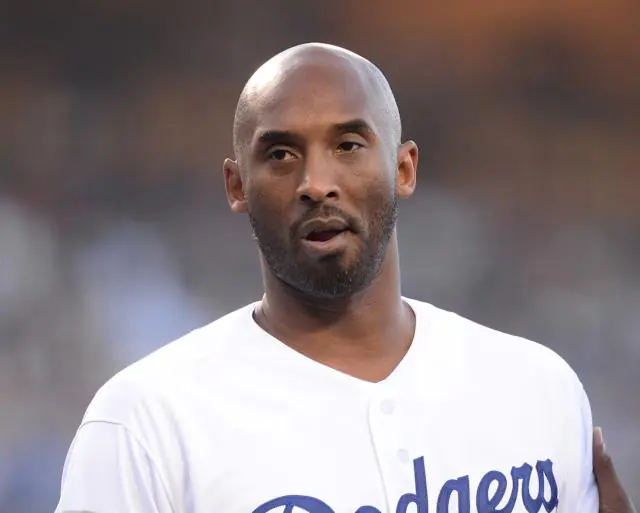
Kobe Bryant Shirtless 5
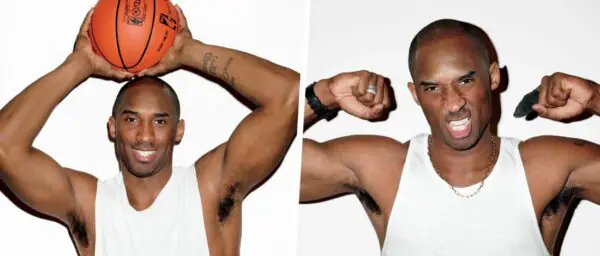
Kobe Bryant Shirtless 4
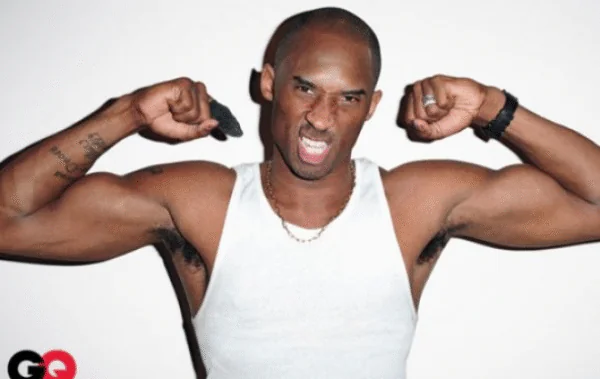
Kobe Bryant Shirtless 3
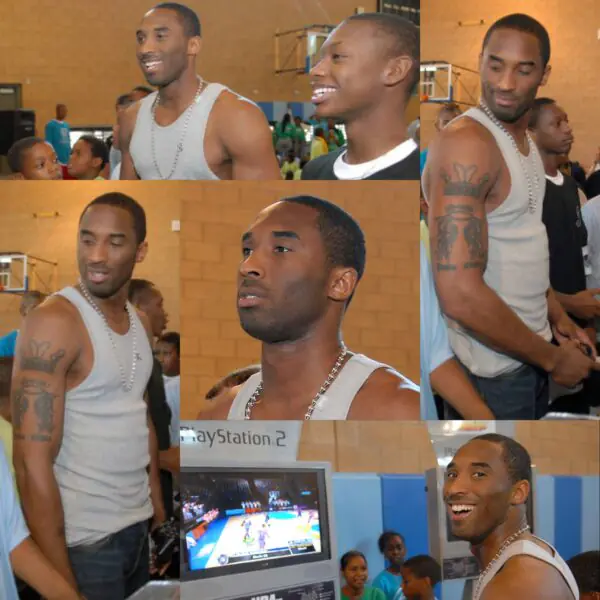
Kobe Bryant Shirtless 2
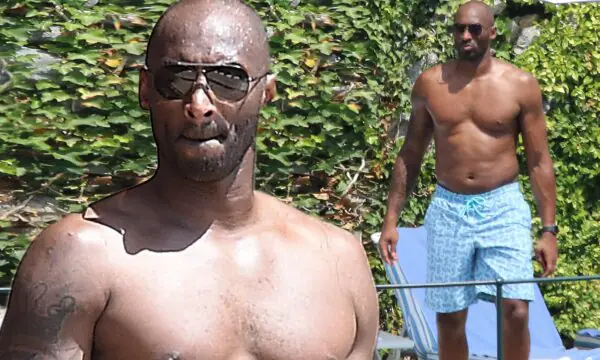
Kobe Bryant Shirtless
Height / How to Get Body Like Kobe Bryant
Kobe Bryant stood at 6 feet 6 inches tall and maintained an athletic, lean physique throughout his 20-year NBA career.
His training was built on a foundation of discipline, including early morning workouts that often began as early as 4 a.m.
Kobe’s routine combined basketball-specific drills with strength training, core workouts, plyometrics, and flexibility exercises.
He worked with professional trainers and also incorporated unconventional methods like ballet and martial arts to improve coordination and balance.
Bryant followed a strict nutrition plan that included lean proteins, complex carbohydrates, and anti-inflammatory foods to support recovery and performance.
He practiced intermittent fasting later in his career and focused on hydration, sleep, and mobility as crucial components of his longevity.
Kobe’s mental preparation was equally rigorous, involving visualization techniques, film study, and meditation to enhance focus.
His core workouts were legendary, including exercises like weighted planks, cable crunches, and hanging leg raises for midsection strength.
Bryant emphasized recovery with tools like cryotherapy, massage therapy, and stretching, often spending as much time on recovery as he did on training.
To emulate Kobe’s body, one must combine physical effort with mental resilience, daily discipline, and consistency over years—not quick fixes.
Interview Quotes of Kobe Bryant (where/when)
In a 2016 farewell letter titled Dear Basketball, Kobe wrote, “I’m ready to let you go. I want you to know now so we both can savor every moment we have left together.”
During a 2010 60 Minutes interview, Kobe stated, “I have nothing in common with lazy people who blame others for their lack of success.”
On The Tim Ferriss Show in 2018, he said, “The most important thing is to try and inspire people so that they can be great in whatever they want to do.”
In a 2015 interview with ESPN, he described his mindset with, “Rest at the end, not in the middle.”
On Jimmy Kimmel Live! in 2016, Kobe joked about his competitiveness, saying, “I don’t play for second place. I don’t even think about it.”
In a 2013 Sports Illustrated feature, he reflected, “I don’t have the luxury of being afraid. That’s a luxury I just don’t have.”
Speaking at the 2017 ESPYs, he advised young athletes, “Greatness is not for everybody—it requires obsession.”
On The Corp podcast in 2019, Kobe emphasized learning: “You gotta constantly learn. That’s how you grow. That’s how you get better.”
In a 2008 post-Olympic interview, he said, “There’s beauty in the struggle. You find out who you are when things go wrong.”
During a CBS This Morning interview in 2017, he noted, “The challenge is always in the moment. The pressure is self-inflicted.”
TV / Movie Quotes of Kobe Bryant (where/when)
In the animated short Dear Basketball (2017), he narrated, “You gave a six-year-old boy his Laker dream, and I’ll always love you for it.”
On Detail, his ESPN+ show, he famously said while analyzing players, “It’s not about talent—it’s about preparation.”
During his 2016 Lakers farewell game broadcast, he addressed fans with, “Mamba out,” which became a defining quote of his legacy.
In a Kobe Bryant’s Muse documentary clip (2015), he said, “I create my own path. It’s mine. I’m not following anybody.”
On The Tonight Show with Jimmy Fallon, Kobe jokingly said, “I’m retired but still working harder than most people who aren’t.”
In an appearance on NBA TV, he advised young athletes, “You have to dance beautifully in the box that you are comfortable dancing in.”
In the documentary The Redeem Team (2022), he said of the 2008 Olympics: “It was about setting the tone early—no games, just business.”
On The Shop (HBO), Kobe remarked, “You can’t achieve greatness without obsession. It’s just not possible.”
In Kobe Doin’ Work (2009), directed by Spike Lee, he commented during game analysis, “You see the move before it happens. That’s the key.”
In a Vogue interview video segment, he once said, “Creativity comes from curiosity, not from knowing everything.”
Controversies / Gossip / Scandals of Kobe Bryant
In 2003, Kobe was accused of sexual assault by a hotel employee in Colorado, a case that led to significant media scrutiny and legal proceedings.
The criminal case was eventually dropped after the accuser declined to testify, and a civil suit was settled out of court with no admission of guilt.
Kobe publicly apologized for the incident, acknowledging the accuser’s feelings and expressing remorse, which became a pivotal moment in his life.
The controversy caused a temporary dip in his endorsements and public image, though he gradually rebuilt trust through community work and on-court excellence.
His relationship with wife Vanessa nearly ended during this period, but they ultimately reconciled and remained married until his death.
In 2011, his use of a slur during a game was caught on camera, leading to a public apology and a $100,000 fine by the NBA.
There were persistent rumors during his career of locker room conflicts, most notably with Shaquille O’Neal, which both later addressed and resolved.
Kobe was sometimes criticized for being too intense with teammates, demanding an ultra-high level of commitment that not everyone could handle.
His reputation as a “ball hog” or overly dominant player followed him for part of his career, though his later years showcased leadership and mentorship.
Despite early controversies, Kobe emerged as a model of redemption, using past challenges as fuel for personal growth and public service.
Lesser Known Unknown Facts Trivia of Kobe Bryant
Kobe Bryant was named after a famous Japanese beef, “Kobe beef,” which his parents saw on a restaurant menu before he was born.
He learned to speak fluent Italian during his childhood years in Italy, where his father played professional basketball after leaving the NBA.
Kobe was a serious fan of storytelling and fantasy, with Harry Potter and Star Wars being among his favorite fictional universes.
Despite his tough exterior on the court, Kobe had a deep interest in classical music and would often listen to Beethoven and Mozart before games.
He once gave himself the nickname “Black Mamba” after watching the movie Kill Bill, aiming to create an alter ego for peak performance.
Kobe was an early investor in BodyArmor, a sports drink company that eventually sold to Coca-Cola, turning his $6 million stake into over $200 million.
He wrote and narrated a poem titled Dear Basketball that not only served as his retirement letter but also won an Academy Award in 2018.
Bryant was highly competitive in everything he did—he reportedly challenged teammates to chess and even tried to out-practice them in piano.
Kobe once trained with the U.S. Navy SEALs to learn about mental toughness and teamwork, applying their methods to basketball.
He was ambidextrous in skill development, often practicing his left-hand dribbling and shooting for hours to perfect balance in his game.
Most Commonly Frequently Discussed Questions/Topics with Answers on Kobe Bryant
Was Kobe Bryant better with jersey number 8 or 24?
Fans are split, with many saying number 8 showed his athletic prime, while 24 reflected his mature, strategic dominance later in his career.
Is Kobe Bryant in the GOAT (Greatest of All Time) conversation?
While fans debates often mention Jordan and LeBron first, Kobe is regularly included due to his championships, scoring skill, and mentality.
How did Kobe’s “Mamba Mentality” influence others?
Fans often share how Kobe’s mindset motivated them in sports, school, and life, citing his dedication, discipline, and drive as inspiring.
Why didn’t Kobe win more MVP awards?
Many fans argue that MVP voting in his era favored narrative over dominance, and Kobe’s consistent excellence was often underappreciated.
What’s the most underrated part of Kobe’s game?
Fans frequently mention his footwork and post-up skills, which were technically advanced and often overlooked due to his scoring.
What is Kobe’s greatest game ever?
Most fans cite his 81-point performance in 2006 against the Raptors, while others highlight his final 60-point game in 2016 as equally legendary.
What was Kobe like off the court?
Fans praise his role as a father, mentor, and storyteller, often citing his efforts to support women’s sports and youth development.
Did Kobe and Shaq ever truly make peace?
Yes, according to fans referencing interviews and public events, they reconciled years after their feud and grew to respect each other deeply.
What are some hidden gems in Kobe’s career?
Fans point to his clutch Olympic defense against Spain in 2008 and his mentoring of young stars like Gianna and Tatum as key non-statistical highlights.
What legacy did Kobe leave behind?
Fans agree his legacy goes beyond basketball—he represented tireless work ethic, second acts in life, and the pursuit of greatness in all forms.